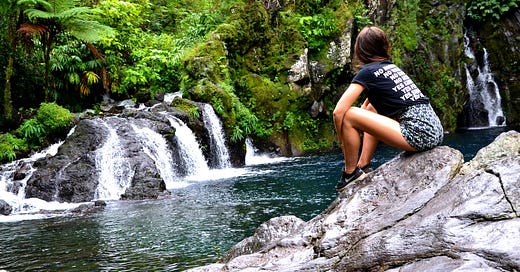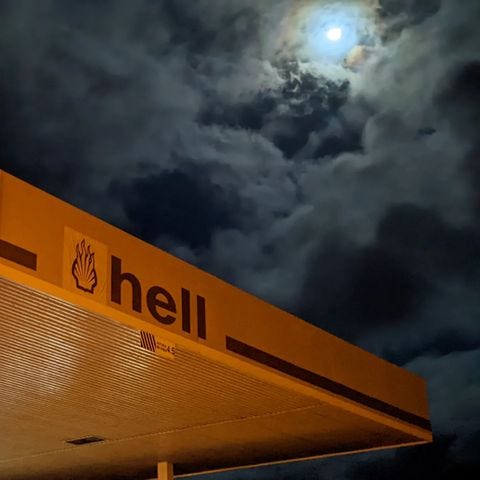Is there such thing as anti-capitalist travel?
Psychogeography and how to explore a place without consuming it
This is the first installment in a new column I’m writing called Psycho Geography! It’s an every-other-week on Monday thing, alternating with Book Rex. Reminder that if you only enjoy some of my columns, you can pick and choose which you receive here.
Modern travel is a nightmare. Tourism is responsible for roughly 8% of all global carbon emissions, mass tourism is regularly eroding and destroying cultural heritage sites and natural wonders, and the stress of millions of tourists inevitably warps the culture of local communities.
This is a hard truth for me. Travel has been a part of my DNA since I was toddler: my father owns a travel business, so I not only got to see the world at a young age, travel literally paid for my college, for the food I ate, for the roofs over my head, until I was well into my 20s. I traveled constantly in my first few decades, chalking up 38 countries by the time I was 26. Later I became a professional travel writer, so pretty much all of the money I made or spent until I was 32 was either from or towards travel. So if there’s a problem, I am not only part of it, I am born of it.
As I worked in the travel industry, my politics — which had once been conventionally liberal — began drifting leftward, and at some point I began to realize that my career and my values clashed. Me and my colleagues mindlessly parroted popular travel quotes like “buy experiences, not things,” not realizing that by buying experiences, we were still mindlessly consuming, often to the detriment of the people who lived near those experiences. Travel was, in many cases, a new form of colonialism, where our impossible wealth was thrown into the same space as their abject poverty, which inevitably led to their exploitation and abuse.
All of this was hard to square with my experience of travel, which was largely positive. It was fundamental to my education and my growth as a person. Even the bad parts of travel were experiences to be learned from. And I hadn’t felt like I was hurting anyone while I traveled. I tried to be courteous, I tried to be open, always a traveler never a tourist.
But as I learned more about the industry, I realized that to try and absolve myself of responsibility for mass travels harm was to miss the point. It was like a raindrop in a hurricane saying, well it’s not my fault what happened. Meanwhile, underneath me is a full city, flooded and drowned by billions of blameless, innocent raindrops.
The Psychogeographers
Sometime after Donald Trump’s election, I learned of a group called The Situationists. The Situationists were an avant-garde libertarian Marxist group that were at their most active in 1950’s postwar France. It was a fairly small group — they continually whittled down their numbers with infighting and personal grudges until there was only one man left, Guy Debord, who eventually died of suicide in the 90s.
But they were remarkably influential. Their ideas are often cited as the main catalyst for the 1968 uprising in Paris, and from there, their ideas snowballed. Inspired by Situationist ideas, the English band promoter Malcolm McLaren created The Sex Pistols, and, in effect, the entire Punk Rock movement. Their ideas around fighting capitalism became influential in the British Reclaim the Streets movement, which later heavily influenced the Occupy movement. The Situationist idea of détournement, which is a hijacking of elements of the capitalist system like billboards and privatized spaces and flipping them on their head, took off in the 80s, and was a major part of the burgeoning street art movement.
The idea that most captivated me, though, was their concept of psychogeography. In short, the Situationists believed that capitalism had destroyed our relationships to the places we live. We have a main space, our home, where we consume things, and a secondary space, our workplace, where we labor in the service of capital. When we leave those two spaces, the only reason we should do so is to move between the two or to go someplace where we can buy more products, thus contributing to the capitalist system.
To fight this, the Situationists recommended wandering. Just walking around with no specific routes, or with arbitrary rules: only take left turns, seek out the color purple, follow a cat you see.
In doing this, you can have spontaneous, strange experiences that are outside what the capitalist society has planned for you. You can find something unexpected that no one else knows about, or you can find some historical site that piques your interest. For the Situationists, this was an act of rebellion.
For me, it’s mostly just been fun — I live in suburban New Jersey, about a mile from the Shore, which was a place that I found impossibly boring for the first few years I’d lived here. Now I’ve got a growing body of knowledge in, for example, famous local explosions, regional cryptids, and littoral ecology. It is not a revolution, but I know that I see things that many of my neighbors don’t.
Can this be done in places that aren’t your home?
One thing that I became convinced of in my time as a travel writer (and earlier, as an immigration activist), was that it is incredibly natural for people to move. The British-Somali poet Warsan Shire once wrote:
no one leaves home unless
home is the mouth of a shark
She was speaking specifically of the refugee experience1, but I think that it applies far more broadly than that — the shark could be an economic or political situation, it could be a bad family situation, it could be a stifling career, lack of educational opportunities, a bad relationship, and much more.
But moving prior to the capitalist era required an immense personal cost. It meant getting a covered wagon and possibly saying goodbye to your home forever. It meant coming back, if you did at all, a much older and totally changed person. We forget that tourism — traveling for leisure and pleasure — is still an extremely new human concept, at least for the vast majority of humanity.
I suspect that the forms of travel that are still worthwhile, that aren’t intrinsically damaging, are the ones that are about going to a place to do something. Moving to a place to work, moving to a place to study something, going to a place to be with family and friends — these are natural forms of travel that humans will never be able to turn off in their programming.
The slow tourism movement embraces these principles to an extent — traveling less frequently, traveling slower when you do, immersing yourself in local life when you arrive — but it’s worth noting that you do not need to travel to truly connect with a place. You can connect with the places that are around you right now.
Have you, for example, ever gone on a foraging walk near you? Have you been to all the museums in your immediate vicinity? Even the small weird local history ones? Have you done every nearby hike? Have you sighted and catalogued every local bird? Have you seen if you’ve got a good local geocaching or urban exploration scene? What’s going on with the local mycologists? When’s the last time you tried out local theater?
This sort of travel isn’t particularly profitable for the global tourism industry, so it’s never going to be the type that they really push. But it is the most sustainable sort of tourism. It involves little in the way of emissions, and you aren’t likely to accidentally vandalize or exploit your own community. And it leaves financial space for those rare times in your life when you may get to go somewhere for the long term — while working from home, while studying, while on sabbatical — and can give another place the same treatment you’ve already learned to give your home.
It’s a devastating poem, read it here.




